Chery Must Break Free from the Live Streaming Trap
![]() 12/31 2024
12/31 2024
![]() 664
664

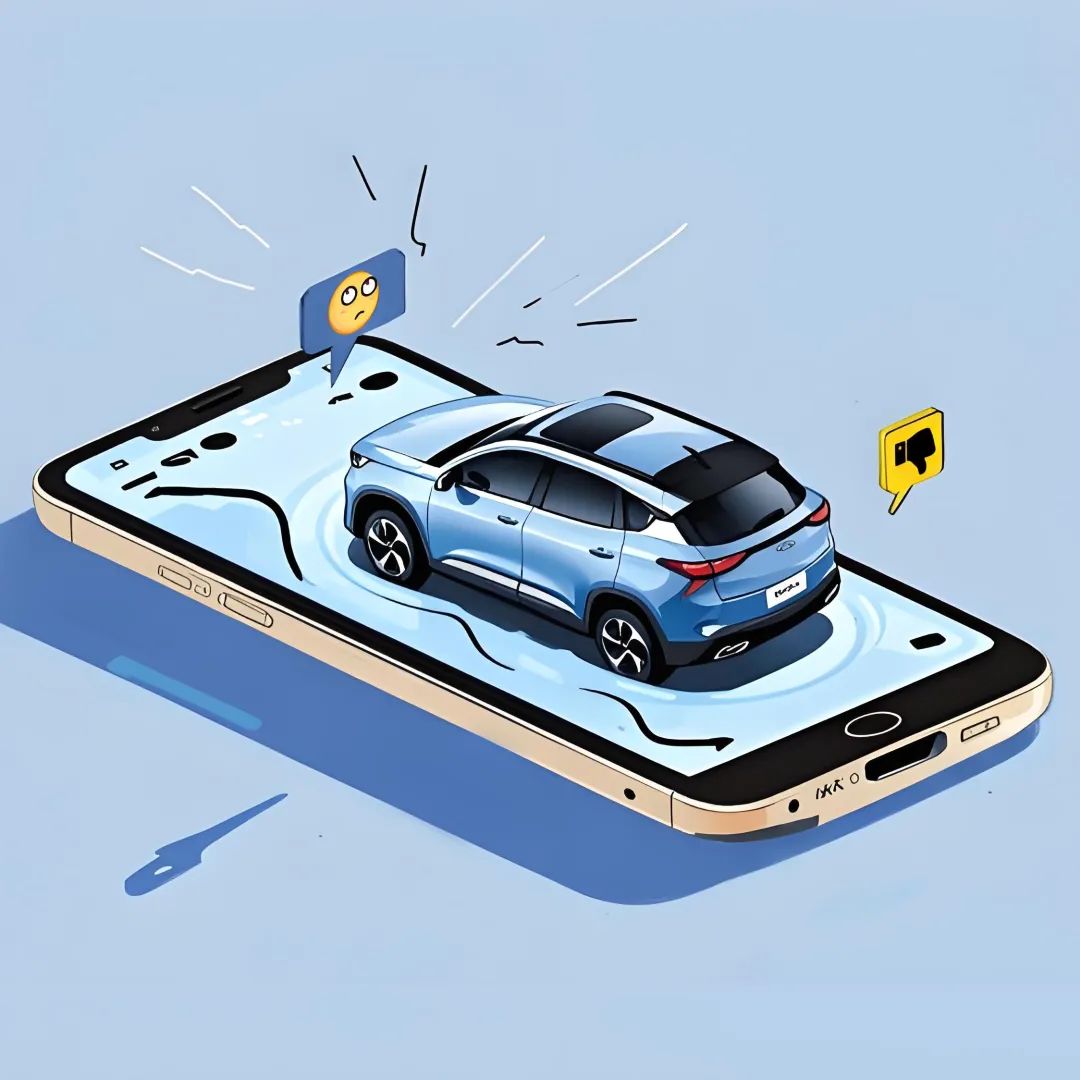
"Traffic and sales volume are not necessarily proportional! The six-month-long live streaming wave among automobile manufacturers has failed to stimulate greater market demand."
@ New Technological Knowledge | Original
The live streaming rooms that automobile manufacturers' executives are rushing into might be turning into hidden traps filled with dangers.
A few days ago, Zhang Hongyu, the general manager of iCAR, promoted the new car iCAR V23 in the official live streaming room and responded to users' doubts about the low configuration: "It's useless to compete in functions and configurations. Many functions and configurations in cars are never used after you get the car."
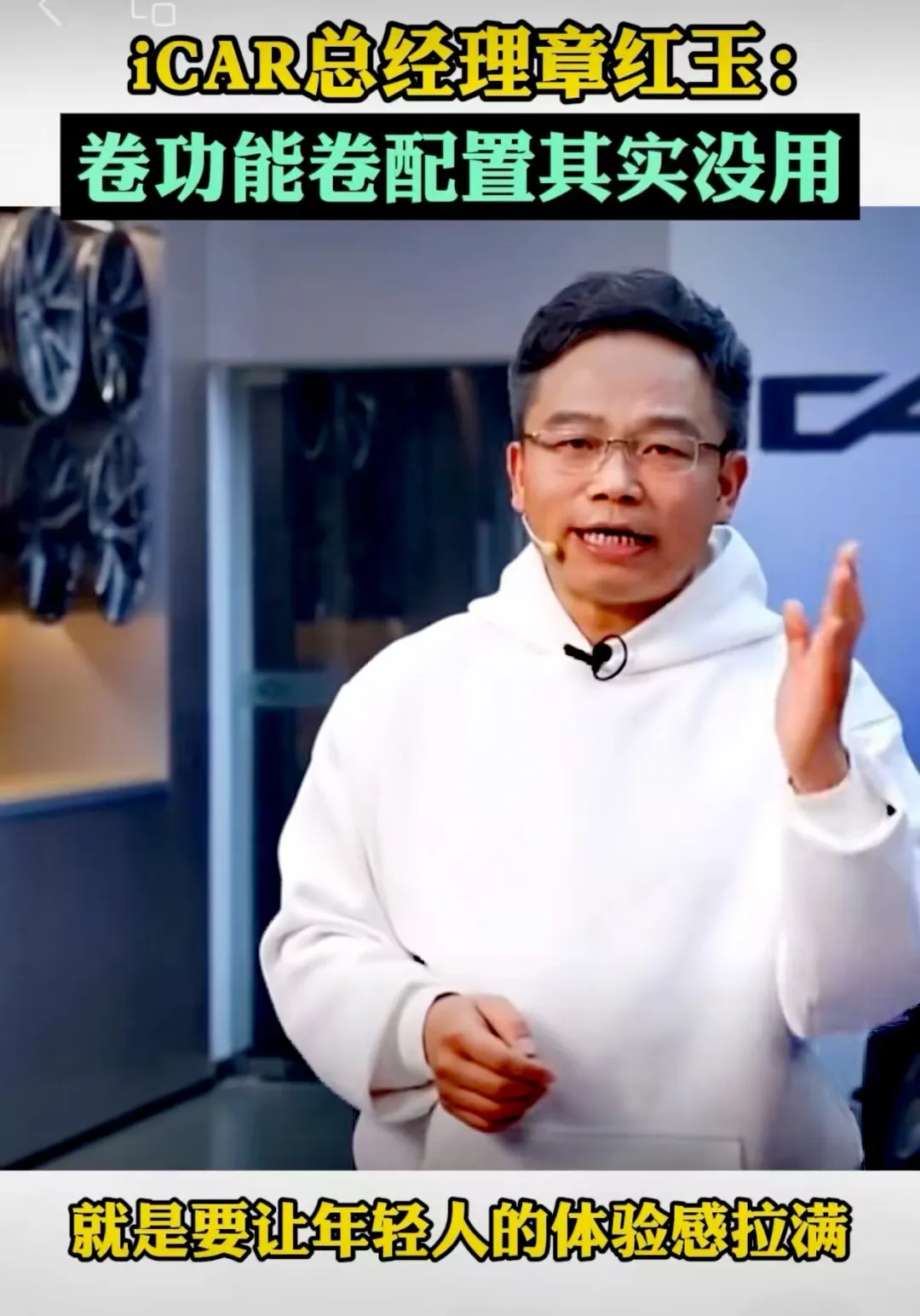
This statement immediately nullified Su Jun's apology following the press conference. Viewers in the live streaming room and surrounding netizens condemned her, believing that Zhang Hongyu's understanding of basic assisted driving and intelligence is too rudimentary, "I may not use it, but you can't be without it."
iCAR, an electric vehicle brand founded through the collaboration between Chery and Xiaomi-affiliated Zhimi Technology, welcomed Zhang Hongyu as its general manager, while Su Jun serves as the CEO of Zhimi Technology. After being hyped up for more than half a year, iCAR V23 was officially launched on December 16 but fell into negative public opinion due to issues such as a lengthy and boring press conference and the need to pay extra for basic intelligent configurations.
In fact, iCAR V23 started pre-sales during the Guangzhou Auto Show in November and surpassed 31,000 orders in just one day. However, after the official launch, it faced a wave of cancellations, prompting Su Jun to apologize promptly and promise adjustments to customer benefits.
Nevertheless, Zhang Hongyu's live streaming gaffe cast a shadow over the crucial sales period for iCAR V23. This "new special economic zone" of Chery, as described by Yin Tongyue, Chery's chairman, has sold a cumulative total of 55,508 vehicles since 2024, with an average monthly sales volume of around 5,000 vehicles. This is obviously still a significant gap from Yin Tongyue's goal of entering the "first tier of new energy vehicles".
Yin Tongyue, who once joked about being a "sixty-year-old man" and personally participated in live streaming, like other traditional automobile manufacturers' leaders, not only took the initiative to learn from Lei Jun of Xiaomi Automobile but also called on all executives to enter the live streaming room. However, when these executives, who have spent years in their isolated offices, suddenly find themselves under the spotlight, even their well-intentioned efforts may inadvertently expose flaws or stubborn habits, adversely affecting the brand.
Whether or not to enter the live streaming room is becoming a question that automobile manufacturers' executives need to reconsider.
01
Chery Executives Who 'Flipped Over'
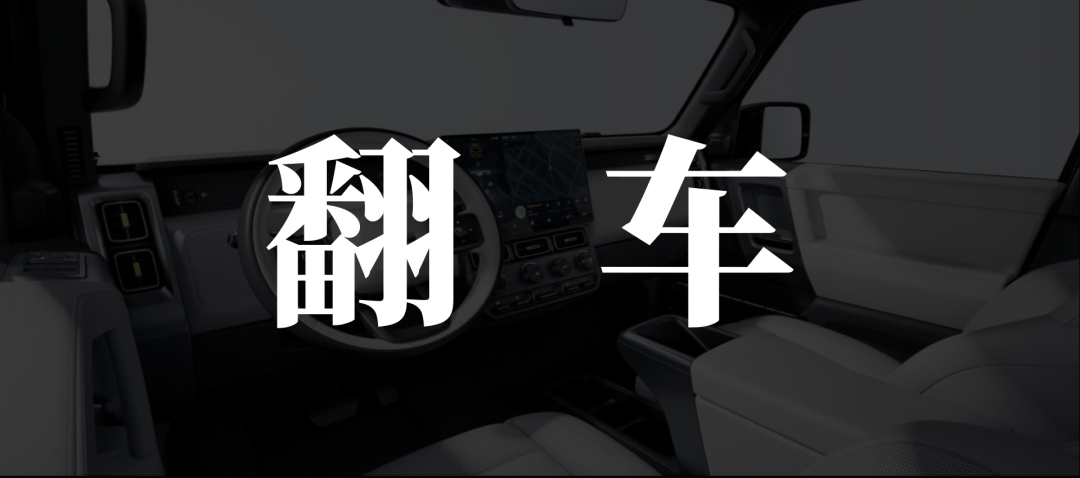
Just three days before Zhang Hongyu's live streaming gaffe, Yin Tongyue participated in Huawei's annual live streaming event for the intelligent connected vehicle solution and personally confirmed that a high-level executive had been dismissed to facilitate cooperation with Huawei. This seems to coincide with the resignation of Han Biwen, the former vice general manager of Chery Automobile and general manager of the Manufacturing Department, amid the controversy surrounding the delayed launch of the Zhijie S7 earlier this year.
In January this year, a rumor spread online that a vice president in charge of Zhijie at Chery had sent an email to the company's internal group, lambasting Huawei for lacking basic respect for Chery and later resigning. At that time, Han Biwen was responsible for liaising with Huawei and faced tremendous pressure due to delays in the mass delivery of the Zhijie S7 caused by Huawei's uncooperativeness.
Subsequently, suspected internal employees of Chery shared screenshots of chat records, indicating that "Huawei fans and their media outlets deliberately smeared Chery" and that "Huawei was unwilling to open the most basic software flashing version, preventing workers on the assembly line from flashing software and delaying vehicle delivery".
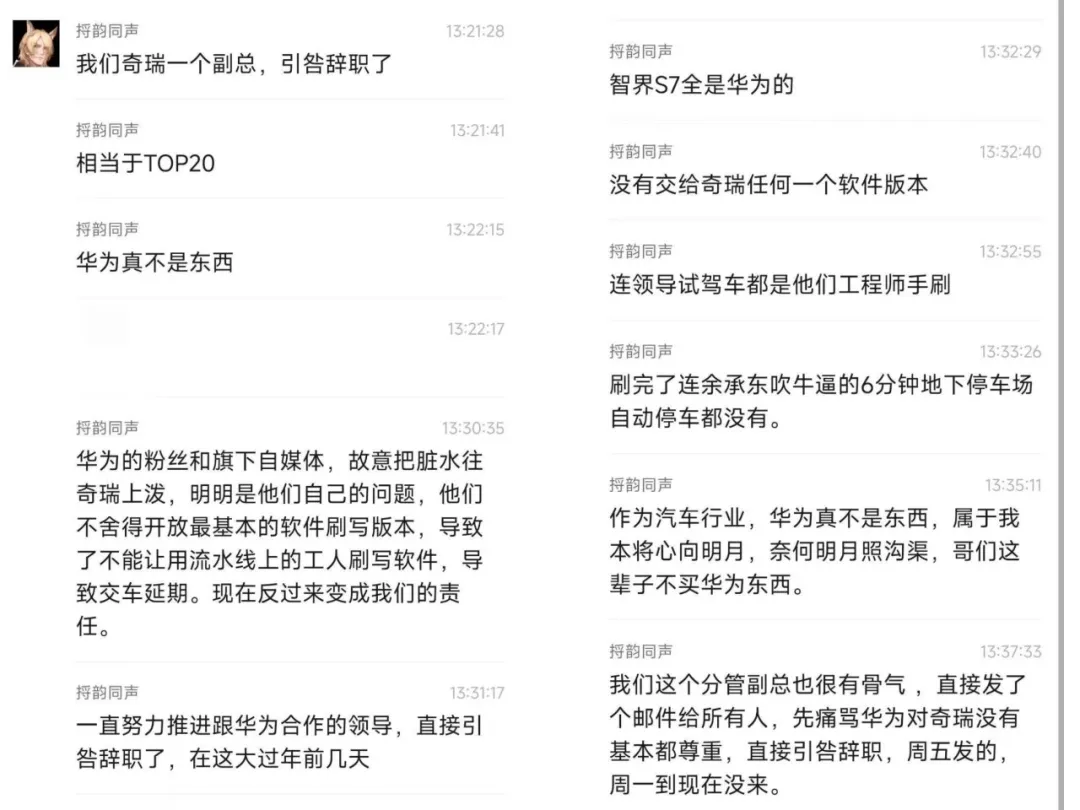
Before the negative public opinion further escalated, Jin Yibo, another executive and press spokesman of Chery, stepped forward to state that the rumors online were untrue, that cooperation between the two parties was smooth, and that the executive's resignation was not due to issues related to the cooperation project.
Currently, Yin Tongyue's statement cannot confirm whether the dismissed executive was Han Biwen himself, but Chery's determination to "replace people who refuse to change their mindset" is evident on its path to transitioning to new energy vehicles. As the vice general manager of Chery and the commander of iCAR, Zhang Hongyu has achieved mediocre results, and his future does not look optimistic.
In the era of fuel vehicles, the automotive market supply chain was well-established and lengthy. OEMs often stood behind 4S stores, and brand promotion remained at a macro level with high-profile advertising. After the disruption caused by new forces in the automotive industry, new automakers with an internet mindset have taken the lead in press conferences, building personal IPs to enhance their brand images.
It is easy for traditionally-minded automobile manufacturers' executives, who are unwittingly drawn into live streaming, to dress up and appear in front of the camera. However, it takes time to develop the grace and sincerity needed to communicate with users in real-time. Zhang Yong, who once served as the executive vice president of Chery New Energy, joined NIO as its CEO and also experienced a "flip" during a live stream.
In April this year, simply because he crossed his legs while sitting during a live stream, viewers compared him to Lei Jun and accused him of being "elitist". Feeling wronged, Zhang Yong responded on Weibo, calling netizens "lickspittles." Regardless of who was right or wrong, NIO ultimately chose to part ways with Zhang Yong and refocus on overseas markets.
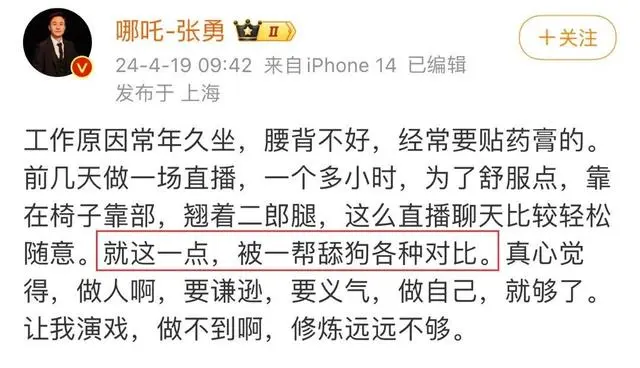
Chery's executives are just a microcosm of the automotive industry.
Established automakers such as BYD and Changan have required their executives to collectively go live under the pressure of industry competition. Fortunately, there have been no negative cases like Chery's, and there have been few outstanding positive results, prompting reflection on whether the strategy of all executives going live is appropriate.
02
The Risks of "Borrowing Someone Else's Eggs to Make an Omelette"

Unlike new automotive forces where the boss goes live alone, traditional automakers can easily send out a team of executives, which is closely related to their long-standing multi-brand strategy.
"The more children, the merrier fights," with the first objective being to distinguish product lines targeting different audiences and the second being to diversify investments and focus on cultivating winners after market validation and elimination through competition.
Geely Automobile's Lynk & Co and Zeekr, as well as Great Wall Motor's Haval and WEY, are successful examples of this strategy. As the wave of new energy surges forward, traditional automakers have mostly chosen the path of "self-research + collaboration" to gain a head start in their transition to new energy vehicles, further exacerbating the expansion of sub-brands.
For example, Chery Automobile's current lineup of new energy products includes the Fengyun series, hybrid versions of its main brand models, the Shanhai series, hybrid versions of its Jietu sub-brand models, and the high-end Xingtu brand's Xingjiyuan series. Collaborative brands include the Zhijie series created with Huawei and the iCAR series jointly developed with Zhimi.
The automotive manufacturing industry inherently relies on economies of scale to create profit margins. Only by operating standardized production lines around the clock, producing vehicles of different configurations and brands, can high investments be offset, leading to greater profits.
For instance, Chery's Xingjiyuan ES and Zhijie S7 are both based on Chery's E0X platform and have extremely similar prices, sizes, and release times. However, despite sharing the same body, they embody different souls: the former emphasizes a luxurious and comfortable cost-effective experience, while the latter highlights Huawei's Hongmeng intelligent driving system.
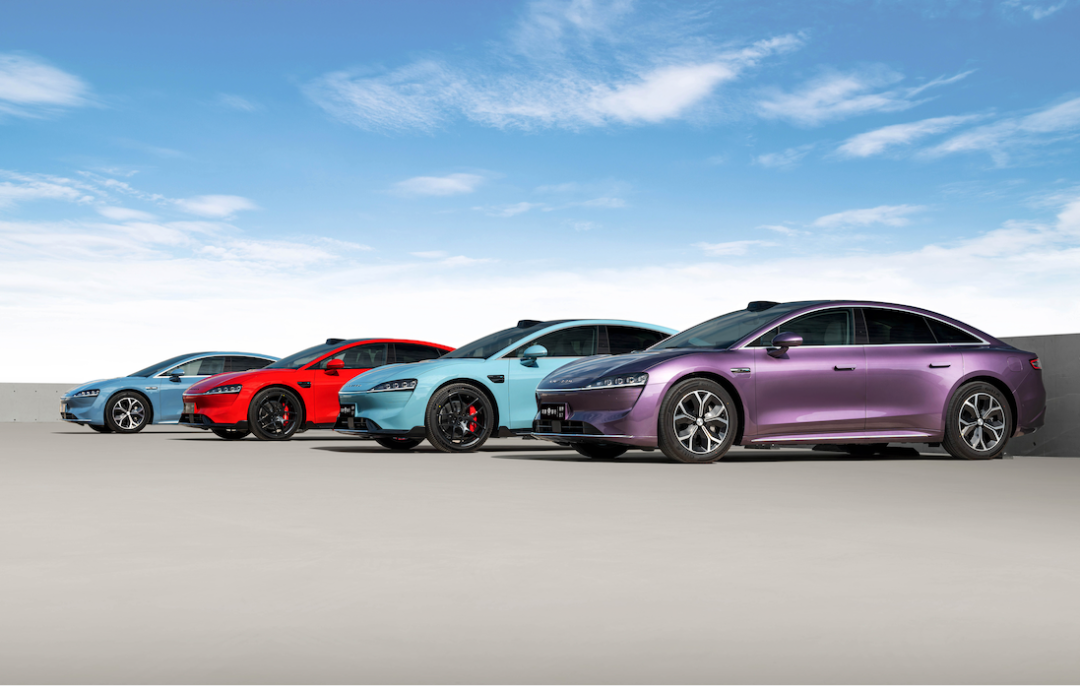
Even though internal competition exists, differences in consumer perception can be guided through terminal promotions, but production-side capacity still requires internal resource competition and allocation within Chery. According to insiders, the Zhijie S7 was originally scheduled for production at Chery's Intelligent Connected Vehicle Super Factory 2 in Wuhu, but during its post-launch period, the factory was still in the trial production stage, with fewer than 10 vehicles rolling off the assembly line each day.
To navigate the challenging capacity ramp-up phase, the Zhijie S7 was temporarily moved to Chery's Intelligent Connected Vehicle Super Factory 1 for production. However, Super Factory 1's primary capacity was already occupied by Chery's own Xingjiyuan ES, Tiggo 8/9, and other main models, leaving only a small surplus.
Therefore, contrary to the perception of some Chery executives feeling disrespected by Huawei, there were also malicious speculations that Chery wanted to capitalize on Huawei's popularity while deliberately constraining the production capacity of the Zhijie S7, using the similarly positioned but lower-priced Xingjiyuan ES to steal sales.
Fortunately, the past difficulties of the Zhijie S7 have been somewhat alleviated by the outstanding performance of the newly launched Zhijie R7. Nevertheless, traditional automakers' strategy of "borrowing someone else's eggs to make an omelette" during their transition to new energy vehicles has gradually exposed drawbacks as they pursue speed. Even Geely Automobile, the originator of the "multi-child tactic," has recently begun to refocus and integrate its multiple sub-brands.
03
Deviation Between Sales Volume and Traffic
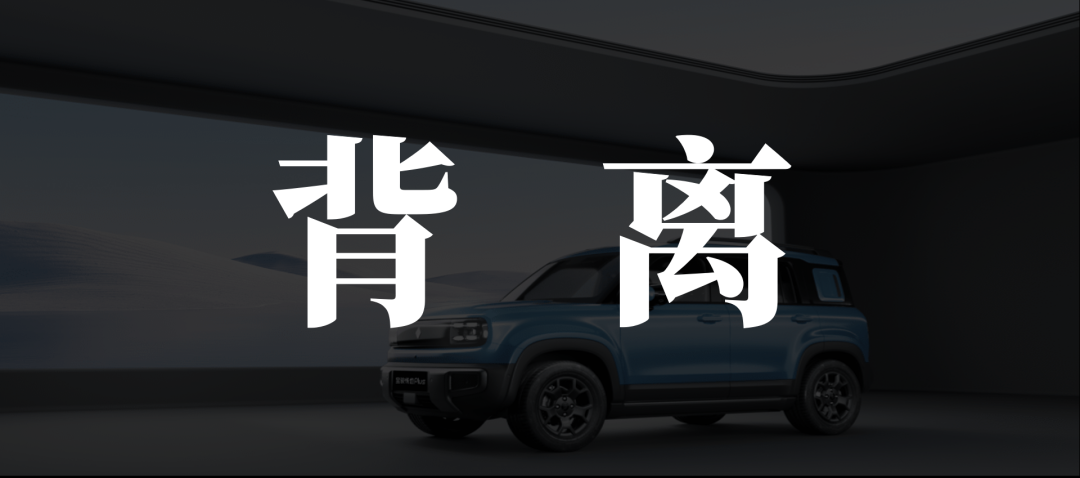
Traditional automakers have pursued new energy by creating more brands, appointing more executives, and opening more live streaming rooms, but traffic and sales volume have not increased proportionally.
In the first quarter of this year, the launch of Xiaomi's SU7 and Lei Jun's tireless activity in live streaming rooms officially ushered in the era of automobile manufacturer executives going live en masse. However, by August of this year, the latest data from the China Association of Automobile Manufacturers revealed that domestic automobile production and sales reached 2.492 million and 2.453 million units, respectively, representing year-on-year decreases of 3.2% and 5%.
The six-month wave of automobile manufacturers going live has not stimulated greater market demand. Instead, by the end of the year, Zhang Yong and Xia Yiping, who had been busy in live streaming rooms for a year, led NIO and Jiyue Automobile to their demise, respectively.
Some automobile manufacturer leaders remain sober-minded, such as Wei Jianjun, chairman of Great Wall Motor. He believes that Great Wall seeks quality traffic, traffic that is recognized and loved by users. Even if it attracts a large amount of traffic, it will never be low-quality traffic created through internet celebrity effects.
Li Bin of NIO also stated that traffic is undoubtedly important, but customers still buy cars because of the products, not because of the traffic. It is essential to return to the essence of products and services.
Overwhelming traffic is also a double-edged sword. Li Xiang, who suffered greatly from it, chose to retreat for more than half a year after the failure of the MEGA. After all, market expectations for the ideal MEGA had peaked before its launch but plummeted after its unveiling due to controversy over its design.
Anxious leaders can still sell with dedication in live streaming rooms, but executives under KPI pressure will resort to "any means necessary" and "panic-stricken choices." A list of debts exposed during the Jiyue dissolution scandal included a claim by Zhejiang Xingtang Cultural Media that 37 million yuan was used for Douyin advertising.
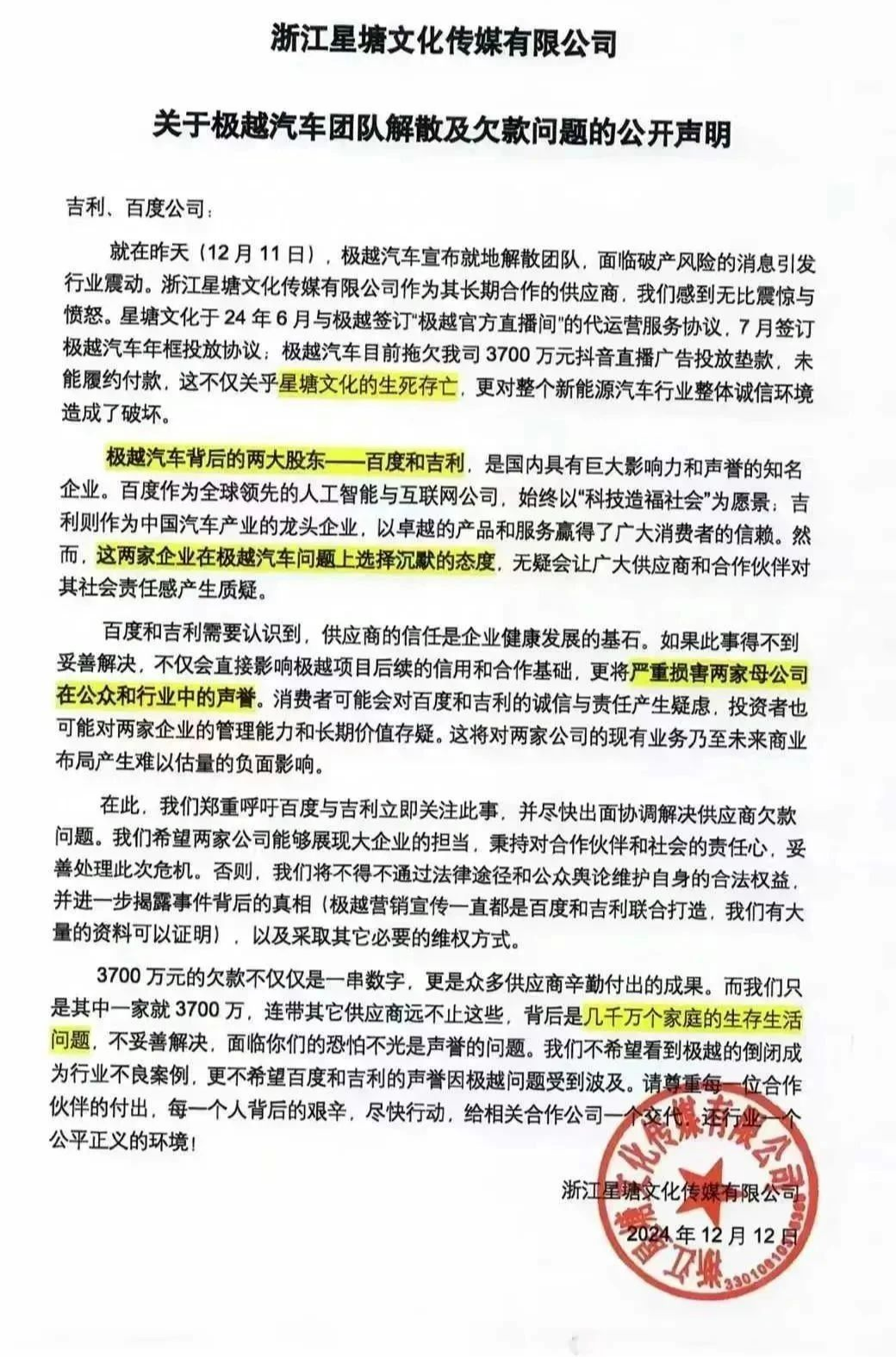
Although Jiyue Automobile's sales reversed their downtrend after Xia Yiping's all-in marketing and live streaming efforts, the slight improvement in sales could not justify the cost, making it unsustainable.
Looking back at the success of new automotive forces' leaders like Lei Jun and Yu Chengdong, they all had a significant fan base in the internet sector before entering the automotive industry. They became famous first and then created good cars, which further enhanced their fame.
The leaders of traditional automakers are generally older and may have slightly different values from younger generations. While it is good to keep up with the times and be eager to learn, they should also consider their own abilities and team capabilities. Moreover, for lesser-known teams of executives, being forced into live streaming rooms while unable to let go of their long-held superiority complex increases the probability of mistakes.
A wave of automobile manufacturer executives exiting live streaming rooms could be imminent!








